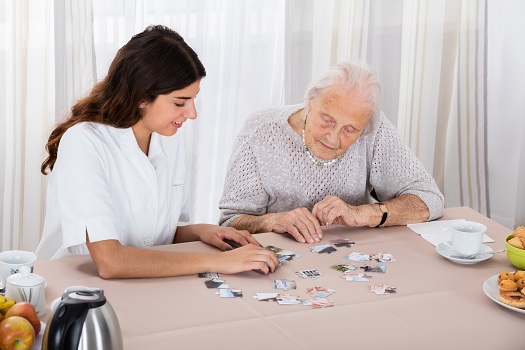Many people think dementia mostly just causes memory loss, but this complex neurological condition can also cause unusual symptoms like hallucinations. These hallucinations can include seeing, smelling, or hearing things that aren’t there, and they’re most common in seniors with dementia due to Alzheimer’s, Parkinson’s, or Lewy bodies. If your senior loved one experiences dementia-related hallucinations, there are a few things you can do to address the situation and maintain his or her wellbeing.
Discuss the Symptoms Calmly
The first thing you should do if you suspect your loved one is hallucinating is talk about what he or she is experiencing. Dementia can cause seniors to mix up words, so your loved one might just be confused instead of hallucinating. Check to see if a hallucination is real instead of dismissing anything odd your loved one says as being a hallucination. In cases where your loved one is clearly hallucinating, it’s fine to calmly state what he or she is seeing isn’t real. Reassure your loved one the hallucinations cannot harm or bother him or her.
Symptoms such as hallucinations, confusion, and agitation are common in elderly people with dementia. Certain age-related conditions can make it more challenging for seniors to age in place safely and comfortably, but Anchorage 24-hour care experts are available around the clock to help seniors manage their health. Whether your loved one is living with dementia or is recovering from a stroke, you can trust the professional live-in caregivers from Home Care Assistance to enhance his or her quality of life.
Avoid Arguing about the Hallucinations
Some seniors might find it helpful to be told their hallucinations aren’t real, but others may respond by becoming upset and belligerent. Try to pay attention to your loved one’s response, and avoid spending a lot of time saying he or she is mistaken. Never raise your voice or tell your loved one he or she is crazy, and drop the subject if he or she gets upset. Trying to convince your loved one the hallucination isn’t real will just be frustrating for both of you.
Talk to the Doctor
Keep in mind hallucinations are a medical symptom, so it’s important to discuss them with a qualified healthcare professional. If your loved one suddenly starts experiencing a lot of symptoms, schedule an immediate doctor’s visit because he or she may have delirium, a type of mental condition caused by medications, infections, or head injuries, so a doctor needs to check your loved one and make sure he or she is doing fine.
The cognitive challenges that accompany dementia often leave aging adults unable to manage everyday tasks, which puts their safety and health at risk. If your senior loved one has been diagnosed with a serious condition and needs help with tasks like meal prep, transportation, bathing, and grooming, reach out to Home Care Assistance, a leading provider of senior care families can trust. We also offer comprehensive care for seniors with dementia, Alzheimer’s, and Parkinson’s.
Use Distractions
All you may need to do to address a hallucination is get your loved one to think about something else. Ask a question or start talking about his or her day. Something that engages the mind, like listening to music, playing with a pet, or starting to work on a puzzle can further reduce hallucinations.
Change What Your Loved One Sees & Hears
Hallucinations often occur when the brain enhances or distorts things a senior is already experiencing. For example, a shadow on the wall might look like a ghost, or a ceiling fan chain may turn into a spider. You can reduce or eliminate these sorts of hallucinations by turning off the television or radio, increasing light levels, cleaning your loved one’s eyeglasses, and removing clutter.
Caring for a loved one with dementia is a challenging task for anyone. The responsibilities can sometimes feel overwhelming, but help is available. Seniors can face a variety of age-related challenges. Though some families choose to take on the caregiving duties, there may come a time when they need a trusted Anchorage elder care provider. Families sometimes need respite from their duties so they can focus on their other responsibilities, and some seniors need around-the-clock assistance that their families are not able to provide. Home Care Assistance is here to help. Schedule a free in-home consultation by giving us a call today at (907) 770-0907.
